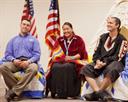Native Honoring Ceremony
Office for Inclusion Native Honoring Ceremony
The South Dakota Mines Office for Inclusion Native Honoring Ceremony is a spring event (May) established in December 2008 by Office for Inclusion to celebrate and honor the School of Mines & Technology's Native graduates by providing a traditional graduation ceremony.
Graduates march into the Surbeck Ballroom in grand entry style led by an InterTribal Color Guard. They then sit on chairs and are draped in star quilts sewn in the school colors by the best-in-area Lakota quilters. The relatives, who have been invited forward, provide an eagle feather or plume. The students receive an eagle feather or plume which is blessed by a traditional elder member of the Lakota/Dakota/Nakota community during the Yu'onihan or Lakota-style honoring ceremony.
Grand Entry, Flag Songs, and Honor songs are provided by various community drums. Guest speakers from among the South Dakota Mines faculty, staff and invited speakers from the Rapid City Native community and beyond are presented to offer stories, words of encouragement, praise, and strength to the graduates.
In past graduation feathering ceremonies, we've had former National Indian Education Association President Robert Cook (Oglala Lakota) as our Keynote Speaker. Otuhan Waste Win (She Gives Away, Generous Woman) Harriet Brings, the (Oglala Lakota) Rapid City School District's Lakota Language Teacher at Central High School, conducts an explanation of the tying of the feathers/plumes, which have been blessed beforehand for the last several graduations by revered Cheyenne River Sioux Lakota elder Gerald Yellowhawk, Wapaha Gluha Najin (Stands with His Staff) who among many other things, is a prestigious Northern Plains artist, traditional dancer, Lakota language translator, and pastor.
From a traditional family of singers and sun dancers, Harriet is the granddaughter of revered medicine man George Plenty Wolf and a descendant of Man Afraid of His Horse. In December 2008, former Porcupine Lakota Language instructor and Vietnam Veteran Dave West, a member of the Cheyenne River Sioux Tribe, also conducted the blessing of the feathers while Harriet explained the Yu'onihan ceremony.
Following the ceremony, the graduates, their families, faculty, staff, and invited guests enjoy a traditional meal of buffalo stew, fry bread, and wojapi. Families also share gifts, quilts, and cakes they have brought. An open microphone is provided during that time for any words of encouragement or honoring of faculty or friends on behalf of students or parents.
To date the Office for Inclusion has proudly honored the stellar achievements of over eighty graduates (including a number of graduate students, both Masters and PhD candidates) in ceremonies with a diverse selection of tribal affiliations including but not limited to Sicangu Lakota, Oglala Lakota, Dine/Hopi, Apache, Cherokee, Muscogee Creek, Ponca, Ojibwe, Stockbridge-Munsee/Mohican, and Yankton Sioux. Graduates have represented many scientific and engineering fields including civil engineering, electrical engineering, mechanical engineering, industrial engineering, metallurgical engineering, geological engineering, robotic autonomous intelligent systems, mining engineering, computer sciences, computer engineering, and atmospheric and environmental sciences..
Our ceremony draws from community Lakota/Dakota/Nakota educators, guest speakers, traditional drums, and cultural resource persons as well as the strong support of Mines faculty and staff. It is coordinated by Director of Inclusion, Jesse Herrera, and the input/support of many in the Rapid City Native American community and area tribal communities and businesses. The South Dakota Mines AISES chapter is also a prime supporter of our honoring ceremony.
We in the Office for Inclusion are proud to continue to present and help preserve these traditional cultural ways of life within our institution to honor our Native graduates and to promote and help ensure their future successes.
